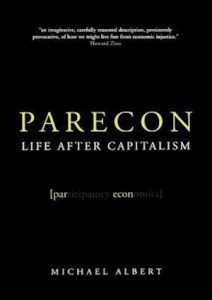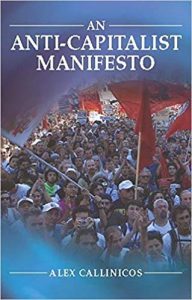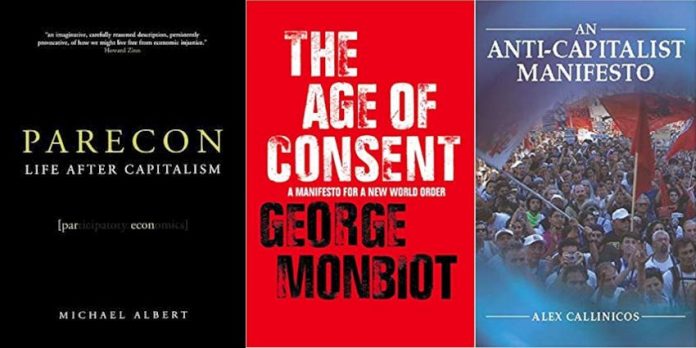Med baggrund i bevægelsen mod den kapitalistiske globalisering er der i de sidste par år udkommet en del bøger, som diskuterer visioner og alternativer til den kapitalistiske markedsøkonomi. Debatten om bl.a. Michael Albert’s Parecon, Alex Callinicos’ An Anti-Capitalist Manifesto og George Monbiot’s The Age of Consent.
Indhold
Forord
Med baggrund i bevægelsen mod den kapitalistiske globalisering er der i de sidste par år udkommet en del bøger, som diskuterer visioner og alternativer til den kapitalistiske markedsøkonomi. Specielt tre af bøgerne har givet anledning til diskussion: Michael Albert’s Parecon, Alex Callinicos’ An Anti-Capitalist Manifesto og George Monbiot’s The Age of Consent.
Her har vi samlet lidt af venstrefløjens debat om bøgerne, samt tilføjet ekstra materiale til diskussionen om en socialistisk demokratisk økonomi. Det meste er på engelsk, men også på dansk/norsk/svensk.
(Parecon er en forkortelse af Participatory Economics = Deltager-økonomi).
Bjarne A. Frandsen, september 2004.
Revideret og ajourført november 2018.
Foreword
In the wake of the movement against the capitalist globalization, a number of books, discussing visions and alternatives to the capitalist market economy, has been published. Three of the books in particular has risen discussion: Michael Albert’s Parecon, Alex Callinicos’ An Anti-Capitalist Manifesto and George Monbiot’s The Age of Consent.
Here we have collected some of the debate among the left wing, plus extra on the discussion of a socialist democratic ecomomy. Most of it is in English, a small portion is in Danish, Norwegian and Swedish.
(Parecon is short for Participatory Economics).
Bøger/Books

Michael Albert: Parecon: Life after Capitalism (London, Verso, 2004, 311 p.)
“An answer to the constant query put to economic and globalization activists: what do you want?” See also reviews and discussion related to the book etc. at ZNet: Parecon. And the book online (Zcomm.org).
Alex Callinicos: An Anti-Capitalist Manifesto (London, Polity, 2003, 180 p.)
George Monbiot: The Age of Consent: A Manifesto for a New World (London, Flamingo, 2003, 288 p.). See Monbiot.com.
W. Paul Cockshott og Allin Cottrell: Planhushållning och direktdemokrati (pdf) (Stockholm, Manifest, 2002, 464 p.)

The English edition: Towards a New Socialism (Spokesman, 1993, 234 p.). With some companion pieces to the book.
Bertell Ollman (ed.): Market Socialism: The Debate among Socialist (New York, Routledge, 1998, 200 p.). Participants: David Schweickart, James Lawler, Hillel Tickstin and Bertell Ollman. See the book online (Epdf.tips).
Alternatives to Capitalism: Proposals for a Democratic Economy. By Robin Hahnel and Erik Olin Wright (Verso, 2016, 158 p.). “[The book] presents a debate between two such possibilities: Robin Hahnel’s ‘participatory economics’ and Erik Olin Wright’s ‘real utopian’ socialism.” See the book online (Ssc.wisc.edu).
Finn Kjeller (red.): Økosocialisme: fra systemkritik til alternativ (Solidaritet, 2015, 245 sider). Med artikler af bl.a. Richard Smith, Daniel Tanuro, Michael Löwy og Pat Devine.
Sites mv.
A Participatory Economy (Participatoryeconomy.org)
Vision for a democratic alternative to capitalism.
ZNet (online at Internet Archive)
- Parecon Watch
“On this page you can find quite a lot of material about parecon, and links to other pages that in turn have much more, as well.” - Debating Parecon
“David Schweickart reviewed Albert’s book, Parecon: Life After Capitalism. Albert replied. Schweickart rejoined. Albert replied anew.” - Movement Building 2004: Vision and Strategy
“Debate between Alex Callinicos of the British SWP and Michael Albert regarding political theory, vision, strategy.”
Wikipedia, the free encyclopedia
- Participatory Economics
Contents: Parecon critique of capitalism – Parecon’s institutional framework – External links – External resources. Se også artikel på svensk.
Artikler / Articles
Wikipedia.org
Catalyst
- Sam Gindin: Socialism for realists (Vol.2, No.3, Fall 2018, p.7-45)
“Without a renewed and grounded belief in the possible functioning of socialism, it’s near impossible to imagine reviving and sustaining the socialist project. This essay picks up this challenge by presenting a set of illustrative institutional arrangements and social relations that advance the case for socialism’s plausibility.” See also:
What a socialist society could actually look like (Jacobin, August 9, 2019). Interview with Sam Gindin.
Chasing Utopia. By Sam Gindin (Jacobin, March 10, 2016). “Worker ownership and cooperatives will not succeed by competing on capitalism’s terms.”
Clarte
- Anders Axelsson och Ola Inghe: Ett alternativ: introduktion till temat Planhushållning (nr.1, maj 2000)
- Anders Axelsson: Demokratisk hushållning i stället för marknadens diktatur (nr.1, maj 2000)
“Presentation av de brittiska samhällsforskarna Paul Cockshotts och Allin Cottrells modell för en fungerande planekonomi. Bl.a. diskuteras moderna former av direktdemokrati.” - Paul Cockshott och Allin Cottrell: En socialistisk uträkning (nr.1, 2000)
“Informationstekniken kan användas till fungerande planhushållningsmodeller. Ett konkret förslag till möjlig beräkning av socialismen.”
Artiklerne er også online på Marxistarkiv.se: Clarté om planekonomi (pdf).
Communist Voice
- Joseph Green: Can participatory economics tame marketplace relations?: about Michael Albert’s new book ‘Parecon’ (No.32, October 2003)
“Albert differs not only from capitalism and anarchist localism, but from market socialism and Stalinist-style economies (which he calls centralism). However Albert doesn’t even bother dealing with the actual Marxist ideal of communism (as opposed to Stalinist state-capitalism in the name of communism). He doesn’t consider the possibility that
central planning based on social ownership of the means of production can be democratic, allow for self-management and very broad local and regional initiative, and eventually eliminate the need, not just for capitalists and corporations, but for money and markets.” - Joseph Green: The structure of a parecon society: an anarchist society that wallows in regulation (No.32, October 2003)
“Below I outline and briefly comment on the main features of a parecon society, as far as I can make them out. Some features of parecon, such as ‘balanced job complexes’, are trumpeted in parecon literature. Other features, such as accounting money, are left in obscurity. And some others, such as the central bank, are bitterly denied, but are implied by how parecon is supposed to operate. To dig the more obscure features
out, I had to examine a number of Albert and Hahnel’s writings. I don’t address here whether all these features of parecon are really compatible with each other, but simply describe what they are.”
Constellations
- August H. Nimtz: Review of An Anti-Capitalist Manifesto by Alex Callinicos (Vol.13, No.4, 2007; online at Internet Archive)
“Much of the last part, ‘Imagining other Worlds’, is a discussion of what a socialist society would look like in terms of justice, efficiency, democracy, and sustainability. In the process, Callinicos engages and responds to the major arguments against the viability or possibility of real socialist democracy and makes the case for a planned economy.”
Fifth International
- Richard Brenner, Sean Murray and Jeremy Dewar: Anticapitalist manifestos: Monbiot, Albert and Callinicos (No.1, November 2003)
“Fortunately, the programmatic discussion in the global anticapitalist movement is not a three way debate between Monbiot’s bourgeois reformism, Albert’s petit-bourgeois utopianism and Callinicos’ centrist attempt to broke a compromise between the workers and the middle class intelligentsia.”
Gnist/Rødt!
- Paul Rækstad: Deltakende demokrati – en sosialisme for fremtiden (nr.3, 2011, s.116-126)
“Det har vært skrevet mye om hva sosialismen vil og bør være, men ofte altfor lite om hvilke konkrete institusjonelle former som kan realisere disse målene. Modellen her, er ett slikt forslag.”
Grus
Tema: Socialisme (nr.25, 1988, 93 s.)
- Alec Nove: Mulig socialisme? (s.7-19)
- Ernest Mandel: Et forsvar for socialistisk planlægning (s.21-30)
In Defence of Marxism
- Josh Lucker: Michael Albert and Parecon (23 September 2014)
“Albert’s Parecon represents perhaps the most serious and well-known attempt to offer a worked-out alternative to capitalism amongst the anarchist left.”
International Socialism
- James Meadway: Life after capitalism (No.100, Autumn 2003, p.113-132). A review of Hilary Wainwright, George Monbiot, Michael Albert and Alex Callinicos.
“The major question for socialists remains the same, even if deliberately not addressed by Albert – how to challenge and overthrow the capitalist state, as a precursor to building a just society. Albert offers a thought provoking and illuminating view of some of the institutions we could look to create in that society. Callinicos’s signposts to that society will be invaluable until we get there.” - Chris Harman: The myth of market socialism (No.42, Spring 1989, p.3-57)
“The tide of free market ideas is running as strongly as ever among socialists, both in the West and in Eastern Europe. Chris Harman confronts the work of Alex Nove, one of the foremost theorists of market socialism.”
Jacobin
- Sam Gindin: Chasing Utopia (March 10, 2016)
“Worker ownership and cooperatives will not succeed by competing on capitalism’s terms.” - Seth Ackerman: The red and the black (December 20, 2012)
“In this essay, I start from the common socialist assumption that capitalism’s central defects arise from the conflict between the pursuit of private profit and the satisfaction of human needs. Then I sketch some of the considerations that would have to be taken into account in any attempt to remedy those defects.” På dansk, se Solidaritet nedenfor.
Marx & Philosopical Review of Books
- Thomas Klikauer: No Bosses: A New Economy for a Better World (27 September 2021) Review of Michael Alberts book (Zero Books, 2021, 220 p.). “Overall, Albert’s book provides a sensible, well thought-out, richly illuminating, highly readable, and exquisitely structured argument for what he calls participatory economics.”
Marxism Today
- Pat Devine: Market mania of the left (pdf) (June 1988, p.34-39)
“The crisis of the Soviet model and the rise of the radical Right in the West is forcing on the Left a major rethink of its attitude towards state and markets. Pat Devine argues that market socialism is not the answer.”
Marxistarkiv.se
- Clarté om planekonomi (pdf)
“Utgångpunkten för de följande artiklarna, som publicerades i Clarté nr 1/2001, var Paul Cockshott och Allin Cottrell viktiga arbete Towards a New Socialism (som 2002 kom ut i svensk översättning under titeln Planhushållning och direkt demokrati; se utdrag: Några invändningar mot marknadssocialism). - Texter av och om den brittiske nationalekonomen Alec Nove
Her også debatten i svensk oversættelse mellem Alex Nove, Ernest Mandel, Roland Lew og Diane Elson. - Debatt om planekonomi (pdf)
Artikelsamling från tidskriften Röda Rummet 2001-2003
Michael Roberts Blog
- Planning and the climate (December 15, 2022)
“The only way humanity has a chance of avoiding a climate disaster will be through a global plan based on common ownership of resources and technology that replaces the capitalist market system. In a new book by Scottish Marxist economists Paul Cockshott, Alin Cottrell and Jan Philip Dapprich, entitled Ecomic Planning in an Age of Climate Crisis [2022, 186 p.], the authors take up this issue.”
Monthly Review
- Robin Hahnel: Against the market economy: advice to Venezuelan friends (Vol.59, No.8, January 2008, p.11-28)
“In sum, contrary to both popular and professional opinion, free markets lead to a very inefficient use of our scarce productive resources, and even when ‘socialized’ by policy correctives, a great deal of inefficiency inevitably remains.” - Harry Magdoff: A note on ‘market socialism’ (Vol.41, No.1, May 1995, p.12-18)
“I would like to use this occasion to try to explain why we feel estranged from the topic … [and] why I think the broader vision needs to take precedence.” Only abstract online.
Movement for a Socialist Future
- Robert Silver: A better world: a response to George Monbiot (2003; online at Internet Archive)
“The merit of Monbiot’s contribution is that he looks beyond the status quo; the weakness of his analysis is that ignores, avoids or sidesteps a series of fundamental issues. These centre around the nature of the capitalist state and the driving forces that compel globalised capitalism to act the way it does.”
New Interventions
- Harry Ratner: Feasible socialism: market or plan – or both? (Vol.5, No.2, 1994)
“A critical appraisal of Alec Nove, The Economics of Feasible Socialism (1983), and Pat Devine, Democracy and Economic Planning (1988).”
New Left Review
- Evgeny Morozov: Digital socialism? (No.116-117, March-June 2019, p.33-67)
“The Calculation Debate in the age of big data.”
Only first page online:
- Fikret Adaman and Pat Devine: On the economic theory of socialism (No.221, January-February 1997, p.54-80)
- Ernest Mandel: In defence of socialist planning (No.159, September-October 1986, p.5-37)
“In this number Ernest Mandel takes issue with Alec Nove. He argues that the working of contemporary capitalism make the historic socialist ideal of a planned economy more attainable and imperative than ever … His powerful and original statement of the case for planning redresses an imbalance in recent discussions of socialist economy, taking debate on it into a new stage.” The article is online at Marxists Internet Archive + in Swedish: Till försvar för den socialistiska planeringen (Marxists Internet Archive, Svenska arkivet). See also Marxistarkiv.se med debatten mellem Alex Nove, Ernest Mandel, Roland Lew og Diane Elson. - Alec Nove: Markets and socialism (No.161, January-February 1987, p.198-104)
- Ernest Mandel: The myth of market socialism (No.169, May-June 1988, p.108-120). In Swedish: Myten om marknadssocialismen (Marxists Internet Archive, Svenska arkivet).
- Diane Elson: Market socialism or socialization of the market (No.172, November-December 1988, p.3-44)
New Politics
- A planned economy with no central planning authority (No.77, Summer 2024). Review of Robin Hahnel, Democratic Economic Planning (Routledge, 2021).
“Tom Wetzel reviews Robin Hahnel’s proposal for democratic economic planning, based on workers’ councils, consumers’ councils and a non-market price system.” - Participatory Democracy minus endless meetings (No.76, Winter 2024)
“Gar Lipow proposes use of revocable proxies in representative democracy and neighborhood assemblies based on participatory democracy.” - Robin Hahnel: Beyond Capitalism: A Participatory Economy (No.75, Summer 2023)
“What do those who are fed up with capitalism propose to put in its place?” - Jason Schulman: It’s still fried ice: on “Market Socialism” (Blog, February 13, 2018)
“In ‘Our Road to Power’, an article from the most recent issue of Jacobin, Vivek Chibber makes some very familiar arguments about socialism and ‘central planning’. One hardly has to quote him—they’ve been repeated many times since Alec Nove’s The Economics of Feasible Socialism appeared in 1983.” - Stephen R. Shalom: In search of economic justice (No.40, Winter 2006, p.157-179). A review essay of Robin Hahnel’s book Economic Justice and Democracy.
“Robin Hahnel has written an important book that will be of real value to all libertarian socialists … Much of Hahnel’s description and defense of the participatory economics model will be familiar to readers of his other books, those of Michael Albert, and those of the two of them together. Here Hahnel offers two new aspects of the model. Both of them seem to me problematic, even partly inconsistent with some basic principles of the rest of the model.”
Røde Fane
Tema: Planøkonomi (nr.3, 2002, s.42-51; online på Internet Archive):
- W. Paul Cockshott og Allin Cottrell: Om å avskaffe ulikhet og ulikeverd. Kap. 2 fra deres bog Planhushållning och direktdemokrati (Manifest, 2002, 464 s.)
“Boka blei utgitt i England i 1993 med tittelen Towards a new socialism. De to skotske forskerne som har skrevet boka, og har oppdatert deler av den i forbindelse med den svenske utgaven i 2002. Dette har blant annet resultert i at denne utgava har fått med seg utviklinga av internett og foreslår omfattende bruk av nettet som et redskap for å utvikle en demokratisk modell for en sosialistisk planøkonomi.” Se bogen online (pdf) + the English edition: Towards a new socialism (Spokesman, 1993, 234 p.). With some companion pieces to the book.
Science and Society
- Special issue, edited by Pat Devine: Building socialism theoretically: alternatives to capitalism and the invisible hand (Vol.66, No.1, Spring 2002, p.3-158) (only contents online)
“Socialism cannot be founded on the ‘invisible hand’, which has in fact become a quite visible capitalist fist since the concept was first promulgated in 1776. It must embrace participatory, democratic coordination and principled methods of evaluation and choice, adequate to the goal of human development and fulfilment that is the ultimate basis of
socialist thought and activity.”
See the article by Pat Devine online: Participatory planning through negotiated coordination (pdf) (p.72-85)
“The aim is to take seriously both the negative experience of the Soviet model of administrative command planning and the positive insights of the Austrian school’s recent reworking of the socialist calculation debate.”
Socialist Register
- Diane Elson: Socialized markets, not market socialism (2000, p.67-85)
“This paper is a contribution to the exploration of the path between the plan and the market, to envisioning not blueprints for market socialism, but possibilities for socializing markets. Markets and money are potentially useful social inventions that predate capitalism, but they always bear the imprint of structures of economic power.”
Socialist Review
- Alex Callinicox: Alternatives to Neo-liberalism (Issue 308, July 2006; online at Internet Archive)
“Advocates of the free market constantly repeat the refrain that ‘there is no alternative’. Alex Callinicos believes that for the movement to be able to answer this claim, it needs to reassert the viability of democratic planning.” - Ian Birchall: We’re only asking for the world: Manifesto for the movement (Issue 272, March 2003; online at Internet Archive)
“Another world is possible is the most popular slogan of the anti-capitalist movement. In his new book Alex Callinicos contributes to the debate about how we get there. As usual, Alex has read all the important books and articles which many of us haven’t got round to.” - Chris Harman: Upsetting the stall (No.172, February 1994). Review of David McNally, Against the Market: Political Economy, Market Socialism and the Marxist Critique (London, Verso, 1993, 262 p.)
“The best chapter in McNally’s book deals with the arguments used by those who claim such democratic planning is impossible.”
Socialist Standard
- Post-capitalist capitalism (No.1218, February 2006) (scroll down)
“‘Parecon is basically an anarchistic economic vision’, admits Albert, and it shows. Like many on the left, the difference between capitalism and post-capitalism presented here is essentially political, not economic.” - Parecon or socialism? (No.1220, April 2006)
“Correspondence between ourselves and the author of the book Parecon: Life After Capitalism.”
Socialist Worker
- Features: The market vs Marx (No.2123, 18 October 2008)
“Socialist Worker invited Eamonn Butler from the Adam Smith Institute to present the case for the free market. In response Chris Harman from the International Socialism journal sets out why the market creates regular crises.”
Socialistisk Information
- Michel Husson: Fra socialistisk økonomi til økologisk planlægning (28. oktober 2019)
“I diskussionen om en økonomisk model, der gør det muligt at tage hensyn til de miljømæssige udfordringer, kan det være nyttigt at hente inspiration i ældre bidrag til socialismens økonomi.”
Solidaritet
- Seth Ackerman: Det røde og det sorte (Kritisk Revy, 14. maj 2021)
“I dette essay går jeg ud fra den fælles socialistiske antagelse, at kapitalismens centrale mangler udspringer af konflikten mellem jagten på privat profit og tilfredsstillelsen af menneskelige behov. Derefter skitserer jeg nogle af de overvejelser, der må gøres i ethvert forsøg på at afhjælpe disse mangler.” In English, see Jacobin above.
Se også Peer Møller Christensen: Ackerman og markedssocialismen (Ibid., 15. august 2021).
Solidarity
- Paul Hampton: I’m an intellectual, get me some politics (Vol.3, No.30, 14 May 2003).
“If the conclusions of this book were to be accepted, and its programme
widely adopted, it would put the socialist project back to the time before Marx. This book is a revival of utopian socialism. Callinicos asks three questions of the anti-capitalist movement: who is the enemy, what strategies are needed to beat this enemy, and what should the goal of the movement be? His answers are: the enemy is capitalism; the goal is socialism, and the strategy is revolution, brought about by fighting for a ‘transitional programme’ of reforms.”
Studies in Political Economy
- Fikret Adaman and Pat Devine: Socialist renewal: lessons from the ‘Calculation’ debate (No.43, Spring 1994; online at Internet Archive)
“This paper seeks to draw some lessons from the calculation debate, both the original and its recent revival, for the renewal of socialism. Part one contends that the arguments of all the major protagonists in the original debate were problematic in that they were set largely within a static neoclassical framework … The second part of the paper assesses the overall position of Dobbs and the neo-Austrians … The paper ends by arguing that a process of participatory planning enables both the social mobilization of tacit knowledge and the ex ante coordination of major interdependent decisions – indeed, that each is a necessary condition for the other.”
Tempest
- Avery Wear: Why we need a planned economy (November 7, 2022)
“Common wisdom, even among socialists, is that large-scale economic planning doesn’t work. Avery Wear reviews three key texts on the question of socialist planning and argues that planning is not only feasible but necessary.”
Trotskyist International
- Keith Harvey: Against market socialism (No.20, June-September 1996, p.24-31)
“Defending the very idea of socialism is one of the most important tasks for Marxists today. It has to be defended not only against its capitalist critics but also the theorists of ‘market socialism’ … In the first two-part articles, Keith Harvey defends the need for socialist planning.” - Keith Harvey: Against the market: planning the future (No.24, June-December 1998, p 21-31)
“In the second of two articles Keith H defends the idea of economic planning without which building socialism will be impossible.”
The Voice of the Turtle
- Peter Waterman: The excessively post-communist manifesto of George Monbiot (October 2003; online at Internet Archive)
“It is no disparagement to say that the new book of George Monbiot looks
more like a twenty first century Social Democracy than the virtual one we have been so far proffered. Monbiot is a prominent public intellectual of the ‘global justice movement’ ”¦ Monbiot’s alternative is a ‘democratic’ one which, in his own argument, distinguishes itself from both the anarchist (and other libertarian) tendencies and the Marxist (and other transformatory socialist) ones.”
Weekly Worker
- Ben Lewis: Fair trade or socialism? (No.510, January 8, 2004)
“In itself, the book is a good read, and Monbiot devotes much space to an
examination of the impoverishment of the ‘third world’; the role of the IMF and World Bank; and the globalised nature of nearly everything in today’s society ”¦ but it would be wrong to conclude that the ideas outlined in The age of consent have anything to do with Marxist analysis.” - Kit Robinson: Valuable but flawed (No.488, July 10, 2003)
“This smallish book [An Anti-Capitalist Manifesto] by the Socialist Workers Party’s chief international spokesperson is evidently aimed at bringing some sort of understanding of Marxism to the anti-capitalist movement … In terms of explaining some basic concepts of Marxism, there is much that is positive in this book – it no doubt will gain a certain readership among those whose eyes have been opened to the iniquities of modern-day capitalism, and will add to the stock of useful literature for any further radicalisation of that diffuse movement. The programme elaborated by Callinicos, unfortunately, is rather a dog’s dinner.”
What Next?
- Chris Gray: A programme for global justice (No.27, 2003)
“The Anti-Capitalist Movement is beginning to say more about the kind of world economy it wants and less about the deficiencies of the status quo. Out of a number of recent contributions to the debate I propose to review these three, by Walden Bello, Alex Callinicos and George Monbiot.”
World Socialist Web Site
- Chris Marsden: Britain’s Socialist Workers Party and the defence of national reformism, Part 1 (5 July 2004) + Part 2 (6 July) + Part 3 (7 July)
“In the guise of a supposedly anti-capitalist manifesto, Callinicos has drafted a rationale for abandoning any pretence of advancing revolutionary politics based on the working class.”
Økosocialisme: fra systemkritik til alternativ
Red. Finn Kjeller (Solidaritet, 2015, 245 s.) (se også bogens site):
- Richard Smith: Seks teser om at redde menneskene, p.37-87.
- Daniel Tanuro: Fundamentet for en økosocialistisk strategi, p.89-109.
- Michael Löwy: Økosocialisme og demokratisk planlægning, p.111-133.
- Pat Devine: Socialt ejerskab og forhandlet koordination, p.135-151.
Se også:
Linkboxen Pelle Dragsteds “Nordisk Socialisme” (Gyldendal, 2021, 384 s.) (Socialistisk Bibliotek)
“Enhedslisten mangeårige folketingsmedlem Pelle Dragsted giver her sit bud på, hvordan venstrefløjen kan forme en bæredygtig socialisme, som bygger på det økonomiske demokrati og det demokratiske ejerskab, vi allerede kender.”
Linkboxen Kapitalismen i krise (2) -2009 (Socialistisk Bibliotek). Se her bl.a. Enhedslisten.

































